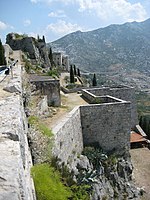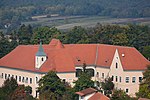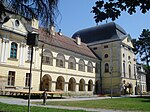Loading AI tools
From Wikipedia, the free encyclopedia
This list of castles in Croatia includes castles, remains (ruins) of castles and other fortifications like fortresses which used to be a castles at some point in history. A castle (from Latin castellum) is a type of fortified structure built in Europe (thus also in Croatia) and the Middle East during the Middle Ages. In its simplest terms, the definition of a castle accepted amongst academics is "a private fortified residence".[1]
Construction and development of manors and castles on the territory of Croatia can be followed with certainty in the last two millennium – from Roman villa rusticas and palaces (like Diocletian's Palace), to medieval castles (burgs), Renaissance villas-summer houses in Dubrovnik and Dalmatia, to Baroque and historicist manors of Northern Croatia, and town villas and palaces in most bigger Croatian towns. The biggest fortress in Croatia is located in Knin.
| Castle | Location | Type | Constructed | Notes | Image |
|---|---|---|---|---|---|
| Adamovich-Cseh Castle | Erdut, Osijek-Baranja County | Manor |  | ||
| Badnjevice Castle | |||||
| Bajnski Dvori Castle | Gornje Ladanje, Varaždin County | Manor | 17th century | Founded by the members of Both of Bayna, a noble family of Hungarian ancestry. Enlarged and renewed in the 19th century in the spirit of historicism. |  |
| Banfi Manor | Štrigova, Međimurje County | Manor | 1373 | Founded by the members of Bánffy, a noble family of Hungarian ancestry. Renewed recently . |  |
| Batthyány Castle | Ludbreg, Varaždin County | 1320 |  | ||
| Belaj | Cerovlje, Istria County | 14th–17th centuries | Well preserved and renovated |  | |
| Bežanec Castle | This baroque castle dating from 18th century was renovated during the 1930s in the classic manner and because of that, it has become one of the most representative castles in Croatia. | ||||
| Bilje Castle | |||||
| Bribir Castle | Bribir, Primorje-Gorski Kotar County | Castle | |||
| Brigido Castle | Lupoglav, Istria County | Castle |  | ||
| Blagaj | |||||
| Brod Fortress | Slavonski Brod, Brod-Posavina County 45°9′23″N 18°0′24″E |
1715–1780 |  | ||
| Bubnjarci Manor | Bubnjarci, Ozalj County | Manor | 15th century | Founded unknown, but later a noble family of Croatian ancestry. | |
| Califfi Castle | Gornje Selo, Zadar County | ||||
| Cambi Castle | Kaštel Kambelovac, Split-Dalmatia County | ||||
| Cetin Castle | Podcetin, Karlovac County 45°08′18″N 15°43′54″E |
Castle | 14th century |  | |
| Cippico Castle | Kaštel Novi, Split-Dalmatia County | 1512[2] | Built as a fortified summer residence by Pavao Antun Cippico, a nobleman from Trogir.[2] |  | |
| Čačvina Castle | Čačvina, Split-Dalmatia County | 1371[3] | |||
| Čakovec Castle | Čakovec, Međimurje County 46°23′20″N 16°25′55″E |
Castle | 13th century | Built by Count Dimitrius Csáky, after whom the city of Čakovec is named. Later owned by many other noble families, including Lacković, the Counts of Celje, Ernušt, Zrinski, Althan and Feštetić. Outside the biggest fortification in Međimurje County, inside the main palace. |  |
| Daruvar Castle | Daruvar, Bjelovar-Bilogora County 45°59′28″N 17°22′36″E |
 | |||
| Drivenik Castle | Novi Vinodolski, Primorje-Gorski Kotar County 45°14′17″N 14°38′48″E |
 | |||
| Dubovac Castle | Karlovac, Karlovac County |  | |||
| Dvigrad | Draga near Pazin, Istria County |  | |||
| Đurđevac Castle | Đurđevac, Koprivnica-Križevci County 46°02′43″N 17°04′07″E |
 | |||
| Falcon Fortress | |||||
| Eltz Manor | Vukovar, Vukovar-Syrmia County 45°21′27″N 18°59′42″E |
Manor | 1749–1751 |  | |
| Erdödy Castle, Jastrebarsko | Jastrebarsko |  | |||
| Erdödy castle, Kerestinec | Kerestinec | ||||
| Erdut Castle | Erdut, Osijek-Baranja County 45°31′36″N 19°03′51″E |
Castle | 14th century |  | |
| Feštetić Castle | Pribislavec near Čakovec, Međimurje County | 1870[4] | Built by count Juraj Feštetić in neo-gothic style. Today houses the Pribislavec elementary school.[4] |  | |
| Fortica Fortress | Otočac, Lika-Senj County | 1619-~1630 |  | ||
| Fortress Kastel | Hrvatska Kostajnica, Sisak-Moslavina County |  | |||
| Fortress Nehaj | Senj, Lika-Senj County | Fortress | 1558 |  | |
| Frankopan Castle | Krk, Primorje-Gorski Kotar County | Castle |  | ||
| Glavaš - Dinarić Fortress | Vrlika, Split-Dalmatia County | Fortress | 15th century |  | |
| Gornja Rijeka Castle | Gornja Rijeka, Koprivnica-Križevci County | Castle |  | ||
| Grižane Castle | Grižane-Belgrad, Primorje-Gorski Kotar County | Castle |  | ||
| Grobnik Castle | Grobnik, Primorje-Gorski Kotar County | Castle | 10th century | From 1225 belonged to the Krčki (later renamed Frankopan) family and from the 16th century to the Zrinskis. |  |
| Gvozdansko Castle |  | ||||
| Hreljin Castle |  | ||||
| Hvar Fortress |  | ||||
| Ilok Castle |  | ||||
| Kamerlengo Castle | Trogir, Split-Dalmatia County 43°30′55″N 16°14′51″E |
Fortress | Mid-15th century |  | |
| Kamičak Castle | Krka National Park, Šibenik-Knin County | 14th century |  | ||
| Kaštilac | Kaštel Gomilica, Split-Dalmatia County |  | |||
| Klenovnik Castle | Klenovnik, Varaždin County 46°16′22″N 16°4′36″E |
13th century | First mentioned in the 13th century during the reign of the Croato-Hungarian king Béla IV; in the late 17th century, king Maksimilijan sold it for 20 000 forint to baron Gašpar I Drašković. |  | |
| Klis Fortress | Klis, Split-Dalmatia County | Fortress |  | ||
| Knin Fortress | Fortress | During the period of the early Croatian state it was an occasional residence of national rulers (Trpimir, Muncimir, Svetoslav, Držislav, Zvonimir and Petar). |  | ||
| Kožljak | Kršan, Istria County | 13th century |  | ||
| Kršan | Kršan, Istria County | 11th century |  | ||
| Lapšina Castle |  | ||||
| Ledenice Castle |  | ||||
| Lovrijenac | Fortress |  | |||
| Lužnica Castle | Manor |  | |||
| Mali Tabor Castle | Castle |  | |||
| Maruševec Castle | Maruševec, Varaždin County |  | |||
| Medvedgrad | Zagreb, City of Zagreb 45°52′11″N 15°56′28″E |
Castle | 1249–1254[5] | Built on southern hillside of mountain Medvednica as a defense from Tatars, who had pillaged Zagreb in 1242. Severely damaged by earthquake in 1590 and described as a ruin by the late 17th century. Renovated in the 1970s, 1980s and 1990s.[6] |  |
| Milengrad | Budinščina municipality, Krapina-Zagorje County | 13th century | Built in the Ivanšćica mountain as a defense from Mongols, property of Cseszneky, Herkffy and Patachich families, described as a ruin by the late 17th century. Hungarian name: Milen vára. | ||
| Mirabella Fortress (Peovica) | Omiš, Split-Dalmatia County | Early 12th century[3] |  | ||
| Monkodonja |  | ||||
| Nečven | Promina, Šibenik-Knin County | Fortress | 14th century | ||
| Nesactium |  | ||||
| Nova Kraljevica |  | ||||
| Novigrad Castle | Novigrad, Zadar County |  | |||
| Novigrad na Dobri | Novigrad na Dobri, Karlovac County 45°28′55″N 15°27′10″E |
Castle | 14th century | This castle once belonged to the famous Croatian family Frankopan, but after the death of its owner, Fran Krsto Frankopan, it was robbed by Austrian general Herbstein. He later sold it to the knights of the catholic Order of Malta who kept it under their rule until 1746. After them, the owners of the castle became the Croatian noble family Patačić and the members of this family lived in the castle until the beginning of 20th century. During the World War II, Novigrad na Dobri was seriously damaged but the enchanting beauty of its ruins still gives proof of its rich history. |  |
| Novi Zrin |  | ||||
| Nutjak | |||||
| Obrovac Castle |  | ||||
| Okić Fortress | Okić, Samobor, Zagreb County 45.7489218°N 15.7067853°E |
Fortress | Medieval Okić Fortress is rare example of preserved Romanesque architecture in continental Croatia. The town was ruled by the counts Okićki, Babonići, Bevenudi, Frankopani, Matijaš Korvin, Ivan Horvat and finally the Erdödy family, in whose time, as early as 1616, the Okić fortress became abandoned and ruined.[7] |  | |
| Opeka Manor | Vinica, Varaždin County 46°19′30″N 16°08′52″E |
Manor |  | ||
| Oršić Castle in Gornja Stubica | 1756[citation needed] |  | |||
| Oršić Castle in Gornja Bistra |  | ||||
| Oršić Castle in Slavetić |  | ||||
| Oršić Castle in Jurketinec | |||||
| Otočac Castle |  | ||||
| Ozalj Castle | Ozalj, Karlovac County 45°36′51″N 15°28′14″E |
Mid-16th century[citation needed] | The oldest part of the castle, Zrinski Palace, was built by Nikola Šubić Zrinski ten years before his death at the Battle of Szigetvár. His son Juraj IV Zrinski built the entry tower in 1599. The castle was renewed and repaired by count Theodor Batthyani (died 1813).[8] |  | |
| Paz | Cerovlje, Istria County | 13th–17th centuries |  | ||
| Pazin Castle | Pazin, Istria County | 10th century |  | ||
| Pejačević Castle in Našice | Našice, Osijek-Baranja county | Castle | 1811–1812 |  | |
| Pejačević Castle in Retfala | Retfala, suburb of Osijek, Osijek-Baranja County | Castle | 1796–1801 | ||
| Pejačević Castle in Virovitica | Virovitica, Virovitica-Podravina County | Castle | 1800–1804 |  | |
| Pietrapelosa | Buzet, Istria County | Castle | 10th century |  | |
| Posert Castle | Cerovlje, Istria County | Castle | 11th–14th centuries |  | |
| Prandau-Normann Castle | Valpovo, Osijek-Baranja County 45°39′33″N 18°24′55″E |
 | |||
| Potravlje Fortress | Split-Dalmatia County | 14th century[3] | |||
| Prozor Fortress | Early 15th century[3] | Built by the Hrvatinić family, the fortress was captured by the Turks in 1523. The Turks held the fortress for two centuries, until they were expelled by the Venetians.[3] |  | ||
| Ribnik Castle | Ribnik, Karlovac County | Castle |  | ||
| Ružica Castle | Orahovica, Virovitica-Podravina County |  | |||
| Samobor Castle | Samobor, Zagreb County 45°47′56″N 15°41′53″E |
 | |||
| Sinj Fortress | |||||
| Sisak Fortress | Sisak, Sisak-Moslavina County 45°29′16″N 16°22′26″E |
Fortress | 1544–1550 | Built according to the order of the Bishop of Zagreb, the owner of the estate, following the increasingly threatening and devastating Turkish attacks on the Kingdom of Croatia. Today it houses the local town museum. |  |
| Slunj Castle |  | ||||
| Sokolac Castle | Brinje, Lika-Senj County |  | |||
| Starigrad Fortress (Fortica) | Omiš, Split-Dalmatia County |  | |||
| Skrad castle | Barilović, Karlovac County | ||||
| Šarengrad castle | Šarengrad |  | |||
| St. Nicholas Fortress | Šibenik, Šibenik-Knin County | Fortress |  | ||
| St. Michael Fort | Preko, Zadar County 44°04′19″N 15°09′35″E |
||||
| Šumber | Sveta Nedelja, Istria County | 13th–17th centuries |  | ||
| Tkalec Manor | Štrigova, Međimurje County | Manor | 18th century |  | |
| Topana Castle | |||||
| Trakošćan Castle | Bednja, Varaždin County 46°15′33″N 15°57′00″E |
Castle | Drašković family occupied the castle until the early 20th century.[9] |  | |
| Trsat Castle | Rijeka, Primorje-Gorski Kotar County |  | |||
| Tržan Castle in Modruš |  | ||||
| Tvrdalj Castle | Stari Grad, Split-Dalmatia County | 16th century[10] | Fortified summer palace of the poet Petar Hektorović |  | |
| Udbina Castle | Udbina, Lika-Senj County | 14th century |  | ||
| Veliki Bukovec Castle | Veliki Bukovec, Varaždin County | 1745–1755 | |||
| Veliki Tabor Castle | Desinić, Krapina-Zagorje County 46°09′17″N 15°39′05″E |
Castle | Early 16th century[9] | Perched on top of a hill, at an altitude of 334 m (1,096 ft), the castle had many owners, among them Ratkaj family and Oton Iveković, a Croatian painter. Today it houses several art and antique collections.[9][11] |  |
| Vitturi Castle | Kaštel Lukšić, Split-Dalmatia County 43°33′18″N 16°22′05″E |
||||
| Vrana Castle | Vrana, Zadar County | Early 12th century |  | ||
| Vrgorac Castle |  | ||||
| Zadvarje Castle | Split-Dalmatia County | 1478–1482[3] | |||
| Zajezda Castle |  | ||||
| Zichy-Terbocz Manor |  | ||||
| Zrin Castle |  | ||||
| Zrinski-Frankopan Castle | Severin na Kupi, Primorje-Gorski Kotar County 45°25′17″N 15°10′08″E |
Castle | 16th century | Castle (palace) with the park in Severin na Kupi was the estate of an aristocrat family Frankopan. The castle was first mentioned in 1558. It is one store building with square ground plan and internal yard and halls with arcades, and outside corner cylindrical towers. There is the part around the castle with a chapel St. Florian. Today's Baroque palace is result of ample reconstruction made in 1803 by owner of that time Count John Oršia. |  |
Seamless Wikipedia browsing. On steroids.
Every time you click a link to Wikipedia, Wiktionary or Wikiquote in your browser's search results, it will show the modern Wikiwand interface.
Wikiwand extension is a five stars, simple, with minimum permission required to keep your browsing private, safe and transparent.